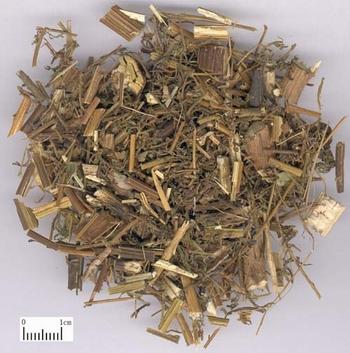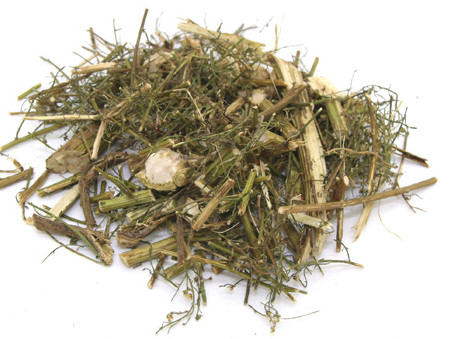青蒿
The Processing of 青蒿
Origin
The aerial parts of annual herbaceous plant Artemisia annua L. of family
Compositae.
Location
Most areas of China.
Harvest
Collected in summer and autumn at the beginning of blossom.
The actual smell and taste
Special smell, slightly bitter.
Best quality
Dry, green, tender, without flower, strong fragrance
Processing
Fresh or cut into segments, unprocessed. .
The Effect of 青蒿
Property
Bitter, pungent, cold; liver, gallbladder and kidney meridians entered.
Actions
Clear deficiency heat, clear summer-heat, clear damp-heat, check malaria.
Application
A. Deficiency heat
It can clear deficiency heat, cool blood, and expel the latent pathogenic heat in blood stem, so it excels in treating endogenous heat syndrome due to yin consumption with latent heat which fails to be cleared completely completely in the terminal stage of warm disease manifested as fever aggravated at night while alleviated at morning, absence of sweating during heat-reducing or lingering of low-grade fever. It is often combined with yin-nourishing and blood-cooling herbs in order to mutually take effects of clearing heat while removing the pathogenic, nourishing yin while reducing heat, such as Bie Jia, Raw Di Huang, Mu Dan Pi, etc., as in Qing Hao Bie Jia Tang from Wen Bing Tiao Bian. For internal disturbance of deficiency heat due to liver or kidney yin deficiency manifested as bone-steaming tidal fever, vexing heat in chest, palms and soles, night sweat and seminal emission, it is combined with liver and kidney yin-nourishing herbs, for example, Bie Jia, Zhi Mu, Di Gu Pi and so on in Qing Gu San recorded in Zheng Zhi Zhun Sheng.
B. Exogenous summer-heat
Except for expelling exo-pathogenic summer-heat externally, it can clear heat and remove dampness internally. It is suitable for syndrome of exogenous summer-heat manifested as fever, thirst, headache and dizziness. It is combined with pungent-cool exterior-releasing herbs and summer-heat-clearing herbs, such as Lian Qiao, Xi Gua Cui Yi, Hua Shi, as in Qing Liang Di Shu Tang from Shi Bing Lun (Treatise on Seasonal Disease).
C. Malaria with chill and fever, damp-heat in liver, gallbladder or spleen and stomach
It excels at checking malaria by its expelling action as well as relieving alternating chill and fever during the onset of malaria. So it is the essential herb for treating malaria through the ages. It can be used singly in high dosage to check malaria, and good effect will be taken. A good example of single use of Qing Hao to 60 g was set in Zhou Hou Fang by draining juice from Qing Hao water infusion. In addition, it can be combined with herbs like Huang Qin and Chai Hu according to clinic syndromes. In modern times, arteannuin, the extractive from Qing Hao and its derivatization compounds are made into pills, capsules and other dosage forms for oral administration, or made into suppository for anal external usage. All those forms have good effect. The ability of its summer-heat-clearing and damp-heat-resolving helps in treating malaria complicated with summer-heat or damp-heat.
Besides, it excels at clearing liver heat and benefiting gallbladder, resolving damp-heat in spleen and stomach, so it is also indicated for syndrome of damp-heat accumulation in triple energizer resulting in disturbance of qi movement manifested as alternating chill and fever as malaria, distention and fullness in chest and stomach, bitter taste, nausea or even vomiting. It can be combined with herbs for clearing heat, removing dampness, promoting flow of qi and harmonizing stomach, such as Huang Qin, Fu Ling, Chen Pi and Zhi Qiao in the formula Hao Qin Qing Dan Tang from Chong Ding Tong Su Shang Han Lun.
Dosage and Administrations
Decoct 6~12g. Over-decocting should be avoided. When treating malaria, take 60 g or 120 g of fresh singly in decoction, or squeezed juice for oral administration.

